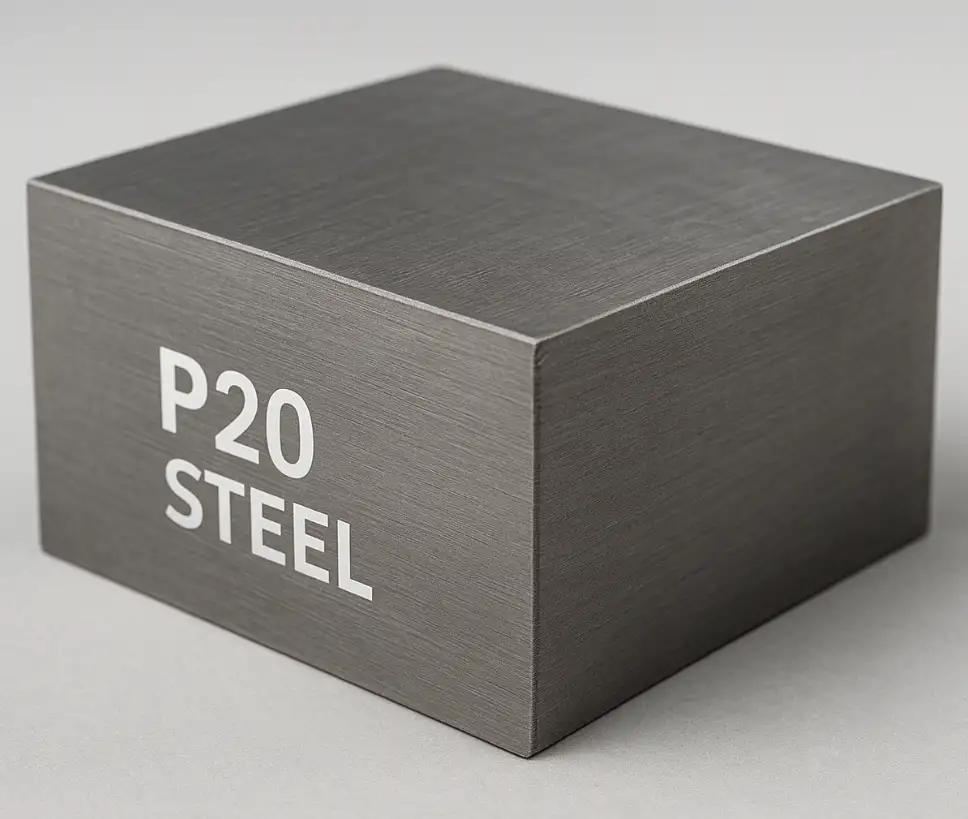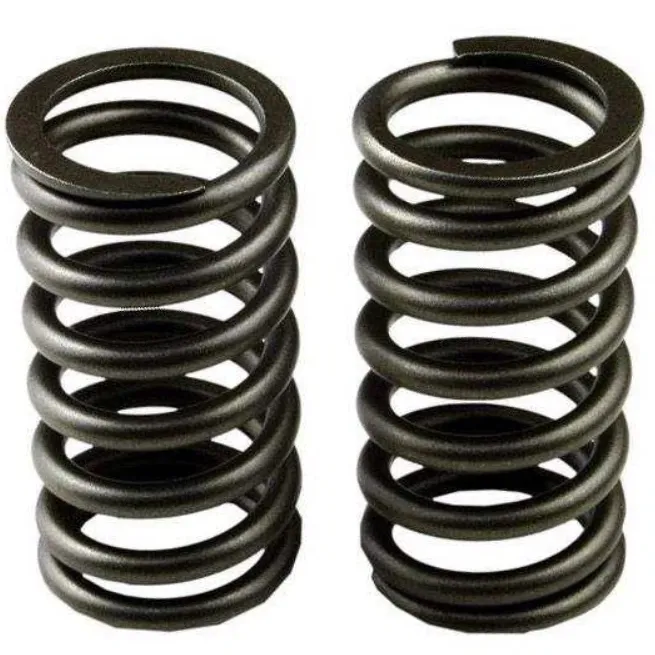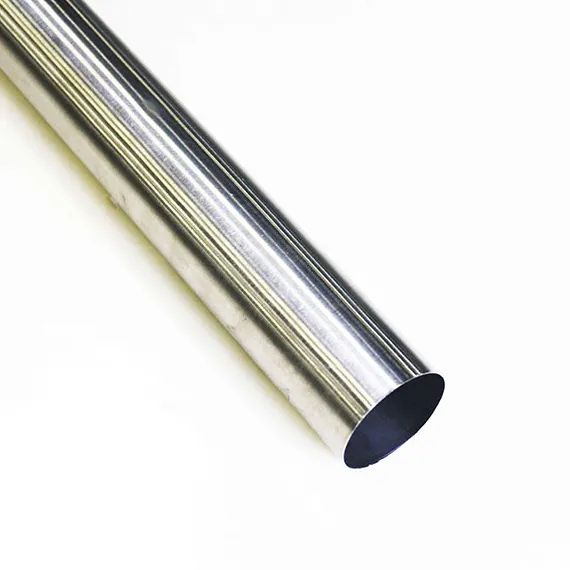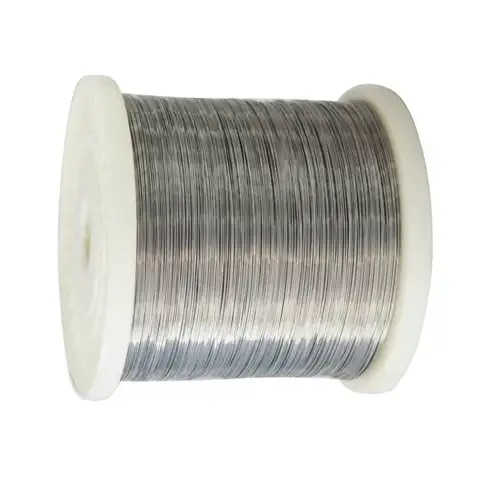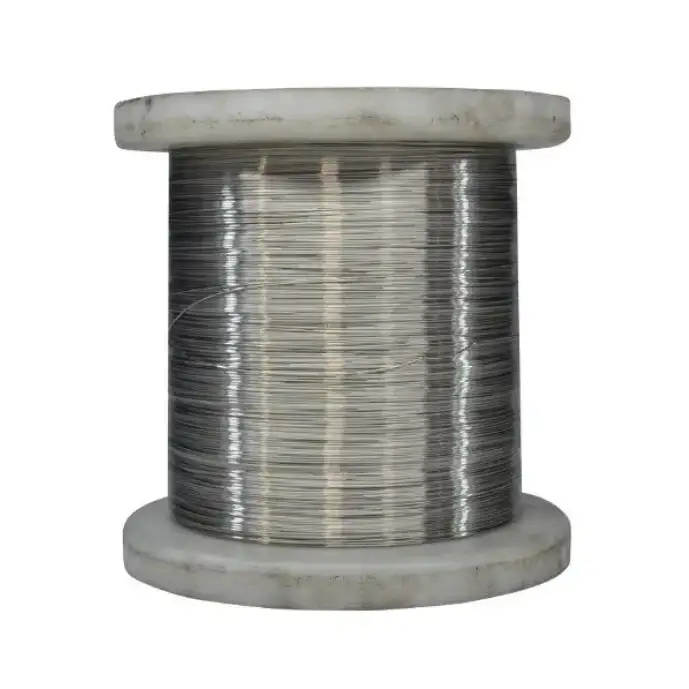P20 mold steel (UNS T51620, commonly supplied as DIN 1.2311 or as the upgraded 1.2738/P20+Ni variant) is the industry standard pre-hardened plastic-mould and die base steel for medium-to-large injection molds and zinc die-casting dies — it balances machinability, polishability and toughness at moderate cost and is an excellent, economical choice for high-finish molds when correctly specified and surface-treated.
What is P20 Mold Steel?
P20 is a low-carbon, chromium-molybdenum tool/mould steel widely used for plastic injection moulds, zinc die-casting dies, and large mold bases. It is normally supplied pre-hardened (no further quench and temper needed for many applications), which reduces distortion risk and saves machining time. The grade is conventionally referenced as AISI/SAE P20 (UNS T51620) and has DIN/European equivalents frequently designated as 1.2311 (P20) and 1.2738 / 718 (P20 + Ni variant). These equivalents and the prehardened delivery condition are why P20 is the predominant “workhorse” steel for many mold makers.
Practical takeaway: choose P20 when you want an economical pre-hardened grade that machines and polishes well and gives consistent hardness across large cross-sections.
Chemical composition (typical / nominal)
Below is a compact table of the commonly quoted composition windows for AISI P20 (UNS T51620). Individual mill certificates should be consulted for final procurement and any alloy variant (P20S, P20+Ni etc.):
| Element | Typical range / nominal (wt. %) |
|---|---|
| Carbon (C) | 0.28 – 0.40 |
| Manganese (Mn) | 0.60 – 1.00 |
| Silicon (Si) | 0.20 – 0.80 |
| Chromium (Cr) | 1.40 – 2.00 |
| Molybdenum (Mo) | 0.30 – 0.55 |
| Copper (Cu) | ≤ 0.25 (some specs) |
| Nickel (Ni) | trace — or added for P20+Ni (1.2738) |
| Phosphorus (P) | ≤ 0.03 |
| Sulfur (S) | ≤ 0.03 |
Notes:
-
P20+Ni / 1.2738 contains additional nickel (improves through-hardening, polishability and toughness).
-
P20S (sometimes listed as 1.2312) contains slightly more sulfur for free-cutting (better machinability) but worse mirror polish capability.
(Citation for table chemistry and variants: supplier datasheets and industry summaries.)
Material properties & mechanical data
These properties are typical for commercial P20 supplied in the pre-hardened condition (delivery hardness ~ 280–320 HB / ≈ 28–34 HRC). Always check the mill test certificate for the delivered product.
| Property | Typical value (metric) | Comment / implication |
|---|---|---|
| Density | ~7.85–7.87 g/cm³ (≈ 0.284 lb/in³) | Standard steel density — use for weight calc. |
| Delivery hardness | ~280–325 HB (~28–34 HRC) | Pre-hardened — reduces distortion vs. hardening after machining. |
| Tensile strength (as-delivered) | ~750–1,100 MPa (varies with heat) | Tensile strength varies with heat treatment; check cert. |
| Modulus of elasticity (E) | ≈ 200–210 GPa | Standard steel stiffness — useful for cavity deflection calc. |
| Thermal conductivity | ≈ 40–45 W/m·K (room temp) | Lower than aluminum — influences cooling design. |
| Machinability | ~60–70% of 1% C reference steel | Good machinability for pre-hard grades — P20S even better. |
| Polishability | Good — excellent mirror finish capability | Why P20 is favored for cosmetic parts. |
Practical note: P20 balances toughness and polishability; if you need higher wear resistance or higher hardness in the cavity, use surface treatments (nitriding, chrome plating) or a harder grade (e.g., 1.2738, S136, NAK80 depending on application).
P20 specifications and equivalents
-
UNS / AISI / SAE: UNS T51620 / AISI P20 (common US designation).
-
DIN / EN: 1.2311 — the common European equivalent often directly sold as “1.2311 / P20”.
-
Upgraded variant: 1.2738 / 718 / P20+Ni — nickel added for improved through-hardening and polishability (preferred for very large blocks or critical surfaces).
-
P20S / 1.2312: sulfur-improved machinability variant (sacrifices mirror finish).
-
Common ASTM/mill specs: many suppliers refer to AISI/SAE/UNS numbers and deliver mill certificates; specific ASTM standards for tool steels exist but grades and processing are typically covered by steel makers’ product datasheets and ordering codes.
When specifying, always state: grade (P20 / 1.2311 / 1.2738), delivery hardness or BHN/HRC, surface finish (hot-rolled / ground / polished), and dimension tolerances.
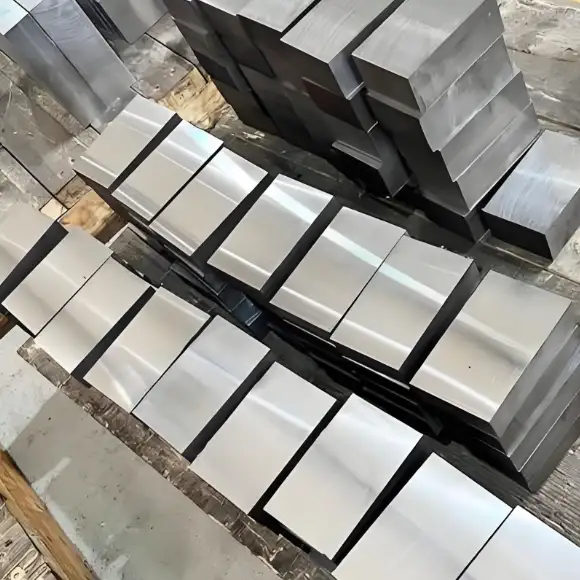
Metal moulding processes
P20 is widely used in the following processes and why:
-
Injection moulding (thermoplastics): excellent polish, good bulk toughness — ideal for cosmetic parts where surface finish is critical.
-
Zinc die casting: P20’s toughness and machinability make it suitable for zinc dies and cold work inserts.
-
Large injection moulds / mold bases: pre-hardened plates and blocks allow large sections to keep uniform hardness — P20+Ni (1.2738) is often used where through-hardening is needed for thick sections.
-
Nitriding / surface treatments: P20 can be nitrided or plated to increase surface hardness and wear resistance without full hardening of the block, which helps prevent distortion.
-
Welding & repairs: P20 has reasonable weldability for repair welding and inserts, but welding parameters and filler metals must be chosen to control HAZ properties.
Design implications:
-
Use P20 for molds where a high finish and good toughness are required at a moderate budget.
-
For high abrasive or high-temperature uses, consider tool steels with higher alloying or surface-hardened inserts.
P20 Mold Steel sizes and weight (typical stock sizes)
Suppliers stock P20 in plates, blocks and round bars. Below are common dimensions (examples — check supplier stock list):
| Form | Typical sizes (mm) | Notes |
|---|---|---|
| Plate (hot-rolled) | thickness 6–250 mm × width 1000–3000 mm × lengths 2000–6000 mm | Surface: black, machined, ground |
| Ground plate / gauge plate | thickness 2–100 mm (ground to tolerance) | Used when high flatness and finish are required |
| Blocks / billets | e.g., 200×200×200 mm up to large custom blocks | Useful for single-piece cavities |
| Round bars | Ø 10–300 mm × lengths 1000–4000 mm | For core pins, ejector pins (often re-machined) |
Weight calculation (metric):
Weight (kg) = volume (m³) × density (≈ 7,850 kg/m³).
Example: a 2000×1000×20 mm plate (0.04 m³) → 0.04 × 7,850 ≈ 314 kg.
(Always confirm with supplier packing weight and tolerances.)
2025 Price comparison — USA / Europe / China
Important: global tool steel prices change with alloying costs, surface finish, remelt/ESR, thickness, order quantity and transport. Below are market ranges observed in 2024–mid-2025 for pre-hardened P20 / 1.2311 / 1.2738 plate and blocks. Use these ranges for budgeting and always request live quotes and mill certificates.
| Region | Typical 2025 price range (USD / metric ton) | Notes / source |
|---|---|---|
| China (factory/FOB, standard hot-rolled pre-hard) | ~USD 700 – 1,800 / t (≈ $0.7–1.8/kg) | Many China suppliers list 0.8–1.5 USD/kg for common stock and $700/t FOB for some hot-rolled lots. |
| Europe (distributor / certified remelt / processed) | ~USD 1,500 – 3,500 / t | Higher due to quality remelt options, processing and inland freight. |
| USA (distributor / processed plate) | ~USD 1,200 – 3,200 / t | Distributor/processed plate prices vary; stocked ground plate commands premiums. |
How to interpret:
-
Low end typically reflects hot-rolled, basic surface (black) and large mill lots sold FOB Chinese ports.
-
Mid / high end reflects ground / polished, remelt/ESR, tight tolerances, or small order MOQ, plus importer/distributor margins, customs and inland freight.
-
P20+Ni/1.2738 or remelted ESR material (for critical mirror-polish tools) can be toward the upper bands.
Procurement tip: always request: grade, delivery hardness (HB/HRC), surface finish (hot-rolled / ground / polished), remelt/ESR status, mill test certificate (chemical + mechanical), and clear EXW/FOB/CIF terms.
Choosing between P20 variants
| Need | Recommended variant |
|---|---|
| Standard injection molds, good polish, economical | P20 / 1.2311 |
| Large thick mold blocks requiring uniform hardness | P20+Ni / 1.2738 |
| Maximum machinability (non-polished parts) | P20S (higher S) |
| High wear/long life cavities | Use P20 + nitriding / case hardening OR switch to a harder grade (e.g., 1.2738 or ESR remelted grade) |
Quality control, finishing & standards to request
When purchasing P20, specify the following to ensure EEAT-level procurement:
-
Mill Test Certificate (MTC): chemical analysis, mechanical properties and heat number.
-
Delivery hardness: e.g., 280–320 HB or 28–34 HRC.
-
Surface finish: black / machined / ground / polished (specify Ra if needed).
-
Remelt / ESR: for critical mirror polish and cleanliness. Ask for ESR / VIM if required.
-
Non-destructive testing (NDT): ultrasonic/etch testing for large blocks.
-
Traceability: heat number and mill stamp to link MTC to part.
-
Post-processing: nitriding specification, chrome plating thickness (if required) and hardness target.
Authoritative standards and references for tool steels and mold steels are maintained by organizations such as ASM, standards publishers and recognized distributors — always reference the mill’s certificate against these recognized specifications during procurement.
MWalloys — P20 offering & why choose our stock
MWalloys supplies factory-direct P20 (1.2311 / 1.2738) plates, ground gauges and blocks from our Chinese mills with strict QA. Key selling points we deliver to global buyers:
-
100% factory price: we supply direct from our mills / factory partners with transparent pricing and no hidden middleman markups.
-
Fast stock & delivery for standard sizes: common ground and black plates are held in inventory — small orders (single blocks) can be cut and shipped quickly (typical lead times shown on product page; contact sales for live stock confirmation).
-
Traceable MTCs & inspection: every lot ships with mill certificates; we can arrange third-party chemical and mechanical testing on request.
-
Custom processing: machining, flat grinding, stress-relief, and pre-nitriding services available so you receive ready-to-install cavity bases.
-
Competitive global logistics: FOB/CIF options and experience exporting to EU / USA / MENA markets.
If you want, provide your target plate size / finish / estimated annual tonnage and we’ll prepare an immediate comparison quote that includes mill certificates and lead times.
Purchasing & specification checklist
Before you issue a PO, confirm:
-
Exact grade: P20 (UNS T51620) vs 1.2738 (P20+Ni) vs P20S.
-
Delivery hardness (HB / HRC).
-
Surface condition: hot-rolled black, machined, ground, polished.
-
Dimensions & tolerances, flatness requirements.
-
Remelt/ESR or other purity requirement for mirror finishes.
-
MTC & heat number traceability.
-
Required inspections: UT / visual / chemical / hardness checks.
-
Post-treatments: nitriding / chrome plate / stress relief.
-
Packaging & shipping terms (FOB / CIF / EXW) and estimated lead time.
-
Warranty / non-conformance handling.
FAQs
-
Q: Is P20 stainless?
A: No — P20 is a low-alloy carbon-chromium-molybdenum steel (not stainless). For corrosion resistance consider stainless mold steels (e.g., 420, 420SS variants or precipitation-hardening stainless steels). -
Q: What is the normal delivery hardness for P20?
A: Typically ~280–320 HB (≈ 28–34 HRC). -
Q: When should I use 1.2738 instead of 1.2311?
A: Use 1.2738 (P20+Ni) for very large sections or when more through-hardening and toughness are required — nickel helps deliver more uniform hardness across thicker parts. -
Q: Can P20 be nitrided?
A: Yes — nitriding is a common surface hardening option to increase wear resistance without bulk hardening. -
Q: What finish is best for cosmetic parts?
A: Use ground/polished P20 (and consider ESR remelt if you need mirror finish and long life). 1.2738 is often preferred for the best polishability. -
Q: Is P20 weldable for repairs?
A: Yes, it has reasonable weldability, but proper preheat/postheat and appropriate filler metals are essential to avoid HAZ issues. -
Q: What’s the weight of a 2000×1000×20 mm P20 plate?
A: ≈ 314 kg (use weight formula volume×7,850 kg/m³). See weight calc above. -
Q: How do prices compare between China and Europe?
A: China factory prices generally sit lower (~USD 700–1,800/t for common hot-rolled pre-hard stock) while European/US distributor priced ground/processed plate is higher (often USD 1,200–3,500/t) due to processing and logistics. Always request live quotes. -
Q: Does P20 need to be heat treated after machining?
A: Usually not — pre-hardened P20 is supplied in a hardened condition suitable for many molds. For higher cavity hardness, case treatments (nitriding/chrome) are used instead of full hardening. -
Q: What tests should I request on delivery?
A: Request MTC (chemistry + mechanical), hardness measurements, and (for critical blocks) ultrasonic or visual inspection and remelt certificate if specified.

